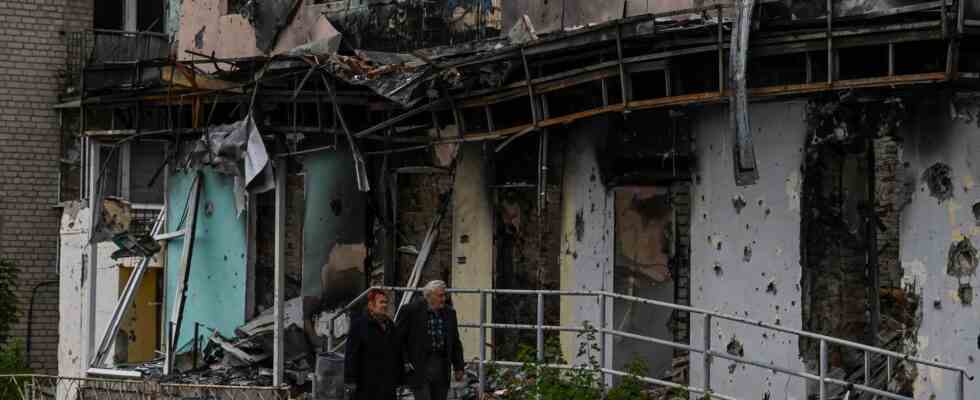report
Status: 09/15/2022 07:11 a.m
The city of Izyum in the Kharkiv region of Ukraine is considered liberated and Russian troops have withdrawn. But the occupiers have left their mark – in the city and in people’s minds.
A Ukrainian tank passes the entrance to Izyum and the soldiers make the victory sign. They control Izyum, and Ukrainian police officers like Oleksandr are patrolling again. He is standing on the bank of the Severskyi Donets river, his gloved hands resting nonchalantly on his black machine gun.
“In the beginning, the invaders bombed and shot at us a lot from planes. They attacked the city with everything they had,” says Oleksandr:
The worst part was leaving the basement in the morning because there were corpses all over the city. As far as I know, 1000 civilians were killed in April alone. We buried people where we found them – near houses, kindergartens or in courtyards.
Stayed in the basement for over a month and a half
Only later did “the occupiers” organize a few people to dig up the bodies and bury them in the cemetery, Oleksandr continues. He kept his job as a police officer secret from the Russian troops as much as possible, and he was no longer able to practice it in occupied Izyum anyway.
“At the beginning of April, when the occupation began, we were in the basement of the kindergarten for a month and a half,” Oleksandr continues:
My little daughter, my wife, her disabled father, mother and grandmother. Then we ran out of food and had to make a choice. We then fled 18 kilometers through the forest with the whole family to escape the occupation.
“I could hug them all”
Alexander Sabodyshin had to spend the entire period of occupation in Izyum. “I can’t even describe what I feel,” says the 72-year-old, leaning against his old bike:
It’s overwhelming. I can’t describe it, we can’t believe it’s all over. We didn’t think it would take so long. Yesterday we were scared – and today we’ll just go out on the street and see each other. I could hug them all.
Looting, robbery, death
During the almost six months of the hated Russian occupation, the 72-year-old pensioner was particularly concerned about his children and grandchildren. When they had to seek shelter from bombs and bullets in the basement, when food and medicine became scarce and when looting, robbing and killing became part of everyday life in Izyum.
“They looted a lot and took everything from us. Food and especially power tools,” Alexander recalls. “We were so poor and scared. Thank God it’s all over.”
It just gushes out of him until he pushes his bike on – past the empty shelled houses that were once the post office or the pharmacy, the bank, the grocery store, the school, the restaurant and the city hall. Now riddled with bullet holes and burned out. Armed soldiers patrol to make sure nobody walks around in the rubble, because everything is mined.
Destruction shocks but no longer surprises
A few hundred meters away, the Ukrainian flag is hoisted on this day. President Volodymyr Zelenskyy attends without prior notice. Less than 20 kilometers from the front, he appears out of nowhere and thanks the soldiers. He looks tired and worn out.
“It’s not a surprise for me. Of course it’s all shocking, but not for me,” says the president about the situation in: “Because we know that from Bucha and the first liberated areas. The same destroyed buildings, people killed.”
The desire to kill – at the age of four
Police officer Oleksandr also has nothing but contempt for the hated occupiers. They were in Izyum “from all corners of Russia,” but also Ukrainians from the Donetsk and Luhansk regions that have been occupied since 2014. “They were all here and the people of Kadyrov (Editor’s note: Ramzan Kadyrov, ruler of the Russian republic of Chechnya) then had a fight with the Russians. About who gets to break into the ATMs first. They walked everywhere and took food, lived in houses, even in kindergartens,” Oleksandr said.
Kindergartens, in the basements of which his beloved little daughter had to endure for weeks. “She doesn’t live in Izyum and is strong,” he says affectionately – but a phone call with her causes him grief.
“Dad, are you taking good care of my toys?” asked his daughter. “Yes,” replies Oleksandr. “And do you have a machine gun?” The police officer agrees. “I need one too,” replies his daughter and when asked why:
I want to kill Russians.
A four-year-old who says she wants a machine gun to kill Russians. The liberation of Izyum wasn’t long ago – and the road to freedom – it’s still a long one.
My daughter now wants to kill Russians. Tour through the liberated Isjum
Andrea Beer, ARD Kyiv, September 15, 2022 6:16 a.m

